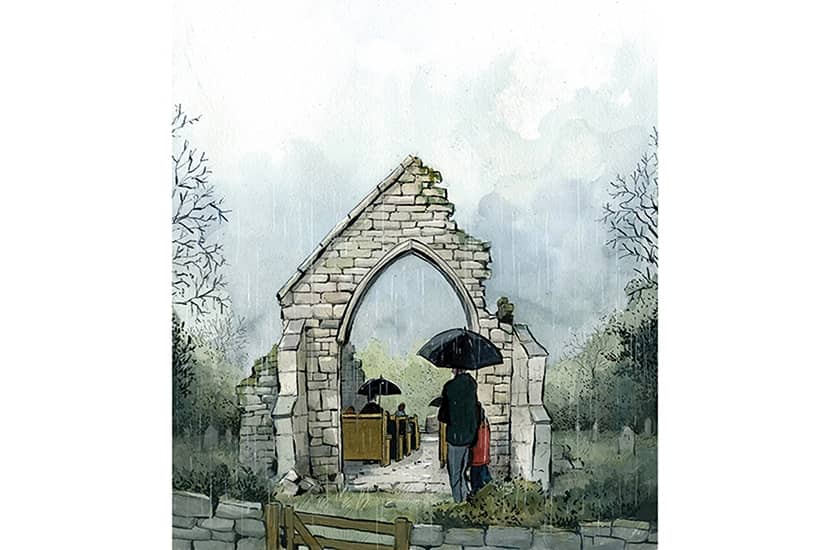Parish problems
Sir: Emma Thompson draws attention to a serious problem in the Church of England (‘Power to the parish’, 25 September). Why are they trying to make it easier to close down parishes when the parish is where the people are to whom the church must minister? The parish is also the major funder of the C of E through the generosity of its many local donors. If you take away the incumbent, you take away a major portion of the income for both parish and diocese.
One reason many parishes struggle to pay their parish share is because it has been swelled by the diocese to pay for the ever-growing bureaucracies. In most cases, parish share is at least 50 per cent greater than the actual cost of paying and housing an incumbent. The C of E’s latest proposals (GS 2222) make it easier to remove incumbents and close churches. This is madness. If the process cannot cope with the problem, then address the problem, not the process.
Stephen Billyeald
Pangbourne, Berkshire
A quick death
Sir: I was surprised to read that Joel Zivot (‘Last rights’, 18 September) believes that ‘assisted suicide is neither painless nor dignified’. As a veterinary surgeon with over four decades of experience, I have probably euthanised more than a thousand animals (dogs and cats, and during the BSE outbreak, cattle) using pentobarbital sodium. Provided that the correct dose is administered, the process is rapid. Importantly, the animal loses consciousness almost immediately (in seconds). That is followed by loss of respiratory and cardiac function, usually in less than a minute.
As far as the effect of pentobarbital on humans is concerned, vets are statistically much more likely to commit suicide, and often use this drug. A close friend chose this method of ending his own life. He was discovered in his surgery, ‘asleep’ on the floor; there was no evidence of any agonal distress at the time of death. I have no position on assisted suicide, I can see both sides of the argument. But the debate needs to be conducted in the presence of facts.
Gerald W. Henry BVMS MRCVS
Leslie, Fife
Politely putsch
Sir: Peter Shutak (Letters, 25 September) says the removal of Ukraine’s President Yanukovych in 2014 was not a putsch but a ‘surrender of central authority’, an enjoyable euphemism. To whom did Yanukovych surrender the authority he had obtained constitutionally, and how? On the night of 20-21 February (as Professor Richard Sakwa records in his Frontline Ukraine), the foreign ministers of Germany, Poland and France brokered a constitutional, peaceful agreement between Yanukovych and prominent members of the opposition. Its provisions included early presidential elections and a return to the 2004 constitution. The demonstrators on the Maidan immediately rejected this plan. One of their leaders is reported to have responded: ‘We don’t want deals… he must step down, and unless this morning you come up with a statement demanding that he steps down, then we will take arms and go, I swear!’ The plan collapsed. Insurgents occupied the parliament building soon afterwards. During the impeachment process, Professor Sakwa records that armed men were observed in the debating chamber. Yanukovych was a terrible president, and his behaviour is indefensible. But some of his enemies were pretty terrible too, and there is no point in pretending that this was a lawful or constitutional handover of power.
Peter Hitchens
London W8
The wives’ stories
Sir: In reviewing Margaret Bullard’s Endangered Species, Matthew Parris illuminates brilliantly the fate of many hugely intelligent women trapped as diplomatic wives in the mind-numbing routines of coffee mornings and cocktail parties (‘The wife’s story’, 25 September). Margaret Bullard was brave enough to let the frustration boil over, for example, engaging undaunted in combat with Margaret Thatcher’s supposedly unchallengeable assertions as assembled husbands looked on tremulously.
The Lady Powell of Bayswater
Rome
Miner ailments
Sir: I read with great interest Simon Heffer’s review of Black Gold (Books, 25 September). Not everyone was unaware of the awful toll that coal-mining work took on health. A small group of doctors working in mining areas — who saw in their patients the injuries, lung disease and general infirmity that mining caused — did something about it. My late father, John Craw, was a young GP in Whitehaven in the 1920s and early 1930s, and saw that he needed to act. He trained as a consultant orthopaedic surgeon, then at the Brompton Chest Hospital, then in Vienna to study specialist fractures, and along with others worked on prevention and screening for silicosis/pneumoconiosis, set up physiotherapy clinics and worked tirelessly for compensation for men affected. The pioneering work by him and others which goes on to this day is a legacy to be proud of.
Alison Hickson
Plymouth
The road to Hell
Sir: In 1971, during a post-graduation summer in Newfoundland, I discovered that the youngest Canadian province had more than its fair share of places with unusual names (‘Notes on place names’, 25 September). On arrival I was driven from Gander through Dildo Run Provincial Park to the Twillingate islands which are separated by the little Tickle. A drive across the short bridge over it leads north and soon I was noting road signs stating ‘Welcome to Paradise’. My memory tells me that after the ‘You are now leaving Paradise’ sign, I saw another welcoming me to Hell. Sadly that may be apocryphal as I cannot find it on the map, but it may relate to Devil’s Cove, which is just to the north.
Alan Rodger
Glasgow






Comments